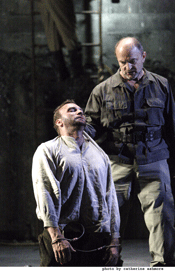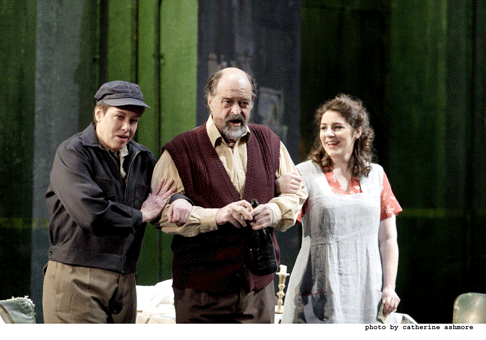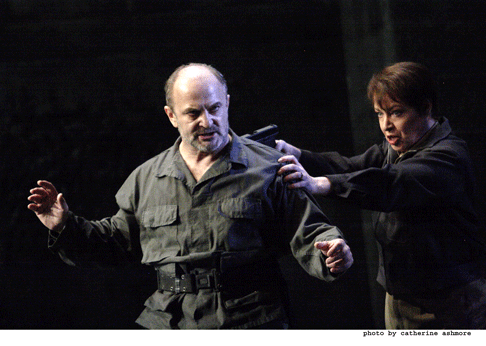04 Apr 2011
Literalism and Truth: Fidelio, Royal Opera
Proof that literalism isn’t truth: Jürgen Flimm’s production of Beethoven’s Fidelio, first heard at the Met and at the Royal Opera House, London in 2007.

Proof that literalism isn’t truth: Jürgen Flimm’s production of Beethoven’s Fidelio, first heard at the Met and at the Royal Opera House, London in 2007.
A straightforward reading of Fidelio is almost a contradiction in terms. The real message is hidden, just as Florestan is hidden, because it’s too dangerous to contemplate. In 1805, the idea that one woman could bring down the system was so unlikely that an authority figure like Don Fernando had to be introduced to make the plot feasible. He’s benevolent but still an Enlightenment despot. Beethoven and his audiences were not naive. They know all too well that Leonore is theory made narrative. Symbolic, not reality.
 John Wegner as Don Pizarro and Endrik Wottrich as Florestan
John Wegner as Don Pizarro and Endrik Wottrich as Florestan
Florestan is more than a prisoner, or even an ordinary man. He’s an embodiment of “Der Edle, der für Wahrheit stritt” (the noble spirit that strives for Truth). Political and philosophical concepts are so fundamentally part of the meaning of this opera that any production that downplays the issues is a betrayal of what Beethoven believed and what the opera is really about.
Jürgen Flimm, however, takes a unswervingly literal approach, without irony or insight. No political or radical passions here. The prison isn’t a mirror of society so much as decoration. Leonore (Nina Stemme) unlocks the cell doors, and out the prisoners pop, meek and mild. Anyone with experience of prisons, even “nice” ones, knows they’re bursting with suppressed violence. So the wonderful chorus “O welche Lust, in freier Luft Den Atem leicht zu heben!” is glorious, but it’s meant to be poignant and symbolic, not literal. Things don’t change so easily. But Beethoven knew the sublime music would have an emotional effect on his listeners. Spurred into sympathy, audience attitudes might change. Only then would there be any chance of real liberation.
Fidelio is a notoriously difficult opera to stage, but there are clues in the music as well as in the stage directions. Beethoven’s Third Symphony (Eroica) is more than a random arrangement of abstract sounds. So Fidelio with its text is even more explicitly concerned with ideas beyond music. It’s much more than a narrative and clues to its meaning are embedded in abstract sound. Fidelity to the script, in the case of Fidelio, means paying attention not just to the words but to what’s happening beneath the surface making the story what it really is.
Leonore’s music in the first scenes is agitated, conveying a sense of entrapment. Yet Stemme is directed to move from one side of the stage to another, dissipating the tension. Fortunately Stemme, like Leonore, has integrity and the stage nous to sing more acutely than she might normally. She inhabits character rather than making sounds for the sake of sound. Her movements are like those of a wild bird, which cannot be caged and seeks freedom. Whether this was in Flimm’s direction, or an idea by Daniel Dooner, revival director, or Stemme’s natural instincts as actress, I don’t know. But she’s able to express more than what’s strictly in the score.
 Nina Stemme as Leonore, Kurt Rydl as Rocco and Elizabeth Watts as Marzelline
Nina Stemme as Leonore, Kurt Rydl as Rocco and Elizabeth Watts as Marzelline
Florestan isn’t easy to cast. He’s an unusually charismatic figure, even more a symbol than a man. He’s so dangerous that he must be kept in solitary in the deepest, most secret dungeon. Again, Beethoven’s abstract music offers clues. Tenor voice, as a deliberate symbol of purity against a dank, dirty background. That’s why Beethoven, normally skimpy with stage directions, specifies a well and piles of rubbish. The vocal part sits high in the register because it represents an alternative to the other male parts, all written for low bass baritone. Florestan should, ideally, shine with glowing light, standing out from the darkness around him.
Since there have been a few wonderfully lustrous Florestans in recent years, such as Jonas Kaufmann, most others suffer in comparison. Endrik Wottrich is adequate, especially given that this unimaginative production asks for nothing more. Perhaps he’d be more inspiring in a production that made more of Florestan’s alluring charisma. Here, he’s not expected to be more than stock character.
Willard White is an impressive Don Fernando. The part is written for big, compelling voices, though significantly, there’s little call for psychological complexity in his music. Don Fernando is a plot device as much as a person. Maybe good kings appoint good ministers, but history has shown that that’s not something we can count on. Again, Beethoven is commenting through music rather than through words. Similarly, Don Pizarro’s music reflects repression, but John Wegner, fortunately, makes more of it than simplistic villain.
 John Wegner as Don Pizarro and Nina Stemme as Leonore
John Wegner as Don Pizarro and Nina Stemme as Leonore
Kurt Rydl is a good solid Rocco, also vocally capable of conveying more than he’s asked to do in this production. The “gold” aria is important as it delineates Rocco’s personality. He’s not materialistic per se, but pragmatic. Not evil enough to kill Florestan, but weak enough to let Don Pizarro do the dirty work. Despots don’t get want they want without “innocent” followers. Elizabeth Watts’s Marzelline is charming, but again barely developed in stage terms. It’s a waste of her very considerable talents as singer and actress. She’s capable of much more. Perhaps Flimm’s too concerned with the trappings of marriage, like bouquets, rather than the spirit of marriage, which is what motivates Leonore.
It says a lot about this production that one of the most successful characters is Steven Ebel’s Jaquino. Left pretty much to his own resources by the nominal Personeregie, Ebel creates the role on his own. Though the part is relatively small, Ebel’s Jaquino comes over as fully thought through and convincing. In his own way, Jaquino is a male counterpart to Leonore. Both are faithful in love, both unfazed by difficult situations. Jaquino’s role is to Leonore’s, a recapitulation of a main theme. Again, Beethoven’s clues lie in the music, not just words.
The choruses in Fidelio are important because they represent the wider world, as opposed to the isolated charcaters in the main roles. The Royal Opera House Chorus is always very good. The voices in the chorus “O welche Lust” were very well balanced, so the effect of sound moving across the ensemble was well realized. The big choruses at the end were stunning. “Heil sei dem Tag, Heil sei der Stunde” sounds like chorale. Commitment expressed with quasi-religious fervour. At last the stage is lit brightly and gloom dispelled. But Flimm places neatly dressed wives and children in the chorus. But while Fidelio celebrates loyalty in marriage, it isn’t really about family, per se.
Sir Mark Elder replaced Kyril Petrenko as conductor on short notice. Elder is nearly always good and reliable, but this time the pace was sluggish, textures spread too far and without much sense of form and dynamics. Maybe the lacklustre production was getting to him as well. Fidelio is so much more than literal narrative. Stripped of conceptual context, it’s nullified, as music as well as theatre. “Wahre Liebe fürchtet nicht.” True love can’t be suppressed. Flimm’s lumpen production proves that literalism kills veracity.
Anne Ozorio